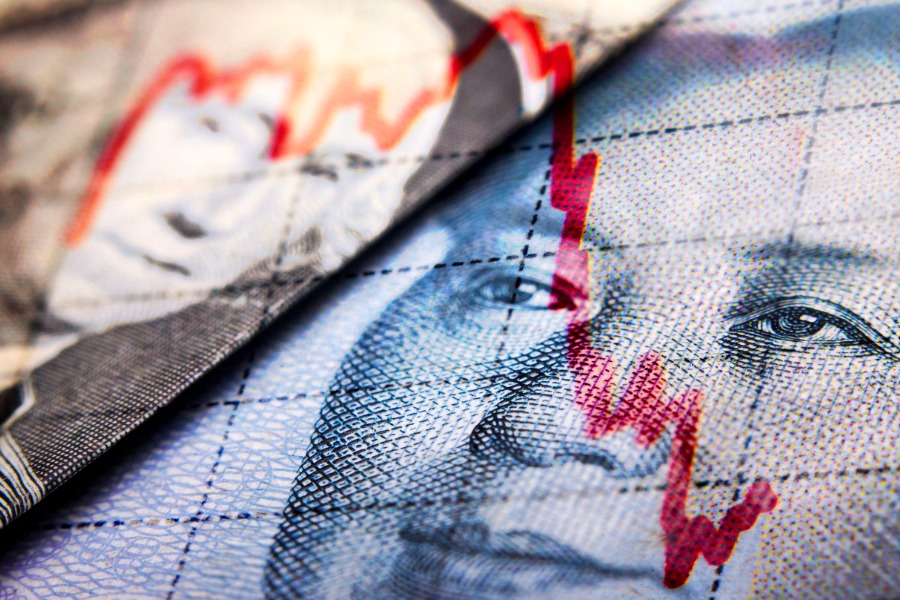

Some investors are overestimating the stockpile of Chinese money that could be converted back into yuan, as firms may not yet be ready to abandon dollar holdings, according to Goldman Sachs Group Inc.
US assets remain attractive to Chinese firms, given the still-large interest rate differentials between the two countries and weak domestic sentiment, analysts including Xinquan Chen wrote in a note Friday. The team calculated that around $400 billion has been hoarded by exporters from mid-2022, a figure below some market estimates.
The yuan extended its recent advance Friday to levels unseen in more than a year, as traders mulled signs of corporate buying amid broad weakness in the greenback. The offshore yuan has surged around 2% in August to erase its losses for the year and is now up about 0.7% in 2024 against the faltering greenback.
Investors have been trying to gauge just how big Chinese companies’ foreign stockpile may be and how much is likely to be repatriated, further fueling the yuan rally. Eurizon SLJ Capital’s Stephen Jen suggested a potential inflow of $1 trillion, half the hoard he estimated has been built up since the pandemic, in a recent interview with Bloomberg News. Barclays Plc’s Lemon Zhang put the figure at a maximum of $100 to $200 billion.
“Our gauge suggests much smaller dollar hoarding by exporters from mid-2022 to 2024,” the Goldman analysts wrote. “The recent yuan appreciation against the dollar is mostly driven by external factors, especially by the changes of market pricing for faster Fed rate cuts and US election, which would discourage yuan shorts.”
For Goldman, China’s weak domestic fundamentals are likely to trump over the medium-term, with the yuan expected to underperform its major peers, according to the note. That contrasts with Jen, the chief executive of Eurizon, who said the impact of the repatriation flows would be like an “avalanche” for the yuan and could strengthen it by up to 10%.
HSBC Holdings Plc strategist Jingyang Chen said she was “circumspect” about whether there would be a tsunami of FX sales in a very short period of time to support further yuan gains, given factors including China’s lackluster fundamentals. HSBC estimates Chinese corporates have accumulated roughly $220 billion in dollar assets in the last two years, Chen said in a note Friday.
China’s currency faces pressure from sluggish growth, as consumer spending slows and President Xi Jinping’s government avoids major stimulus. Traders are also waiting to see whether the People’s Bank of China pushes back on the managed currency’s strength, wary of its impact on the country’s exporters.
Still, the yuan got an additional fillip this month by the sudden collapse of so-called carry trades, where the currencies of countries with low interest-rates are used to buy higher-yielding assets. That sent the likes of the yen and yuan surging as investors rushed to pay back loans.
For Goldman, the potential return from US assets is still high for yuan holders, and that’s a key factor in any repatriation decision for Chinese firms.
“The persistent feedback we receive from corporates is that they will only sell their dollars if the carry profile changes or if they are confident the dollar is on a downtrend,” the analysts said.

Relationships are key to our business but advisors are often slow to engage in specific activities designed to foster them.

Whichever path you go down, act now while you're still in control.

Pro-bitcoin professionals, however, say the cryptocurrency has ushered in change.

“LPL has evolved significantly over the last decade and still wants to scale up,” says one industry executive.

Survey findings from the Nationwide Retirement Institute offers pearls of planning wisdom from 60- to 65-year-olds, as well as insights into concerns.
Streamline your outreach with Aidentified's AI-driven solutions
This season’s market volatility: Positioning for rate relief, income growth and the AI rebound
